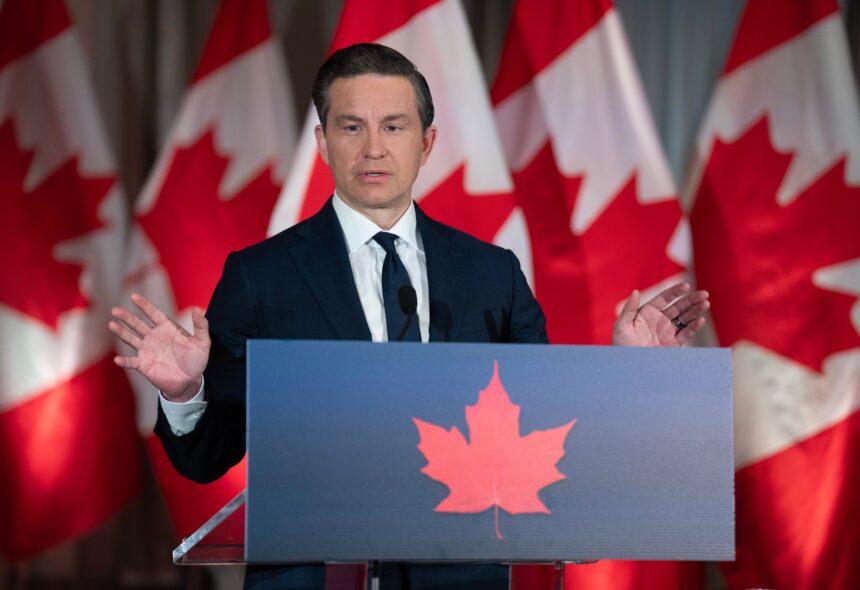As the July humidity blankets Ottawa, a new kind of heat is rising inside Parliament’s stone walls. Conservative Leader Pierre Poilievre has ratcheted up pressure on his political rival Mark Carney, demanding the former Bank of Canada governor completely divest his financial holdings rather than rely on ethics screens if he enters the political arena.
“These so-called blind trusts are just blindfolds for the public,” Poilievre told reporters Tuesday morning on Parliament Hill. “Canadians deserve complete transparency, not financial shell games.”
The controversy ignited after Carney, long rumoured to be considering a Liberal Party candidacy, acknowledged maintaining substantial investments while serving as the UN Special Envoy on Climate Action and Finance. During that role, Carney helped shape policies that critics say could have benefited his personal holdings.
Finance Minister Chrystia Freeland defended Carney, calling him “a financial mind unparalleled in Canadian public service.” Speaking after a meeting with provincial counterparts in Toronto, Freeland suggested the attacks were politically motivated. “What we’re seeing is fear of a formidable opponent.”
But the Conservative leader’s demands go beyond standard political jousting. Poilievre pointed to Carney’s directorship at Brookfield Asset Management, which manages over $750 billion in assets globally, including significant fossil fuel investments. This connection raised questions during Carney’s climate advocacy work, where he promoted policies potentially benefiting companies like those in Brookfield’s portfolio.
“You can’t simultaneously push climate policy while profiting from the very industries you’re regulating,” said Poilievre. “It’s like being both referee and player.”
The controversy reflects deeper tensions about financial conflicts in public service. Ethics Commissioner Konrad von Finckenstein has established precedent allowing cabinet ministers to use conflict of interest screens rather than requiring full divestment. These screens involve third-party management of assets while prohibiting officials from participating in decisions directly affecting their financial interests.
Andrea Whitfield, who teaches ethics at Carleton University, says the situation highlights growing public skepticism. “Canadians increasingly demand more than technical compliance. They want their leaders to eliminate even the appearance of conflict.”
Recent polling from Angus Reid suggests 72% of Canadians believe politicians should fully divest from private investments when holding significant public offices, regardless of party affiliation.
Carney responded to the controversy through a spokesperson, stating he “has always adhered to the highest ethical standards” and would “fully comply with all requirements” if he pursues public office. The statement stopped short of committing to full divestment.
At Tim Hortons locations across Ottawa’s Centretown, where political staffers gather for morning coffee, opinions mirror the national divide. “It seems like a double standard,” said Martin Desjardins, a government contractor. “Regular public servants face strict rules about even minor conflicts.”
Others see political opportunism. “Poilievre owns rental properties while advocating housing policies,” noted Alisha Wong, a university student. “Everyone has some conflict. The question is about transparency.”
The controversy emerges as both parties position themselves for a potential 2025 election. Liberal insiders have quietly suggested Carney could reinvigorate their economic message, particularly as cost-of-living concerns remain voters’ top priority according to the latest Nanos Research poll.
Financial disclosure requirements have evolved significantly since the 2006 Federal Accountability Act, but critics argue they haven’t kept pace with increasingly complex investment vehicles. The Conflict of Interest Act requires public office holders to either divest controlled assets through a blind trust or sale, but interpretation of these requirements has varied.
“The spirit of the law seems clear,” said Democracy Watch spokesperson Duff Conacher. “People in powerful positions shouldn’t be making decisions that could benefit their own pocketbooks, directly or indirectly.”
Poilievre’s demand puts Carney in a difficult position. Complete divestment would mean potentially selling hundreds of millions in assets, possibly at unfavorable terms. Yet maintaining investments under ethics screens risks ongoing political vulnerability.
For everyday Canadians watching from provincial capitals to small towns, the debate touches deeper questions about who government serves. At the West Block scrums where reporters gather, the conversations often return to public trust.
“When people are struggling with grocery bills, they need to believe their leaders aren’t playing by different rules,” said Poilievre, whose populist messaging has resonated particularly in rural communities and among younger voters frustrated with economic conditions.
As Parliament nears its summer recess, the controversy shows no signs of cooling. Liberal strategists admit privately that addressing Carney’s financial arrangements has become an unexpected hurdle in their efforts to recruit him as a standard-bearer for their economic vision.
Whatever the outcome, the debate has already shifted expectations for political transparency. As one veteran Hill staffer put it, “The days when financial disclosures were buried in obscure filings are ending. Social media and heightened scrutiny mean these questions now play out in real-time, for better or worse.”






